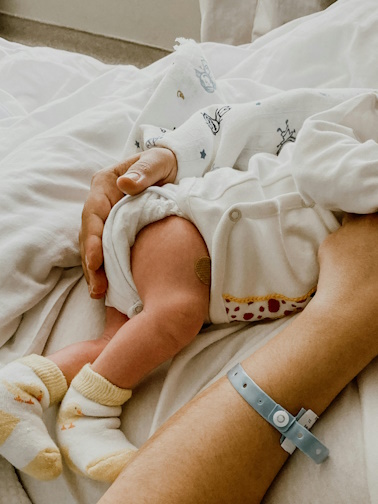
As you embark on the beautiful journey of bringing a new life into this world, there’s a whirlwind of emotions and preparations swirling around you.
Among all the excitement and anticipation, one task stands out as crucial and daunting: packing your hospital bag for delivery.
Having been through this transformative experience, I want to share my insights and lessons learned to help guide you through this pivotal moment with confidence and ease.
Getting Started: When to Pack Your Hospital Bag
The question of when to pack your hospital bag is one that often lingers in the back of your mind as your due date approaches.
From my own experience, I found that packing around the 34th to 36th week of pregnancy gave me ample time to gather everything I needed without feeling rushed or overwhelmed.
However, every pregnancy is unique, so trust your instincts and start packing when it feels right for you.
Your Essentials: What to Pack for Yourself for Labor and Delivery
When it comes to packing for yourself, focus on comfort, practicality, and the items that will help you feel grounded and supported during labor and delivery.
Here’s a rundown of what worked well for me:
Comfortable Clothing: Loose-fitting, breathable clothes were a lifesaver during labor.
Think soft robes, comfortable pajamas, and cozy socks or slippers to keep you feeling comfortable and relaxed.
Toiletries and Personal Care: Don’t forget your toiletries! Pack travel-sized essentials like toothpaste, toothbrush, shampoo, conditioner, and moisturizer to maintain your hygiene and freshness.
Snacks and Hydration: Labor can be energy-intensive, so keep yourself fueled with healthy snacks like nuts, granola bars, and dried fruit.
A refillable water bottle will help you stay hydrated throughout labor and delivery.
Entertainment and Comfort: Labor can be unpredictable, so pack items to keep yourself distracted and comfortable.
Books, magazines, a tablet loaded with movies or music, and comforting items like a favorite blanket or pillow can make a big difference.
Birth Plan and Important Documents: If you have a birth plan outlining your preferences for labor and delivery, be sure to pack a copy.
Don’t forget important documents like your ID, insurance information, and hospital registration forms.
Baby Essentials: What Your Little One Needs
Your newborn will also need a few essentials for their hospital stay. Here’s what I packed for my baby:
Newborn Essentials: Pack diapers, wipes, onesies, or bodysuits, and a soft blanket for swaddling.
While hospitals often provide basic baby supplies, having your own can provide added comfort and familiarity for your little one.
Going-Home Outfit: Choose a special outfit for your baby’s journey home.
Keep it soft, comfortable, and weather-appropriate, and don’t forget a hat and mittens to keep them warm.
Car Seat: An essential for bringing your newborn home safely, make sure you have a properly installed car seat ready to go before leaving for the hospital.
Partner’s Needs: Supporting Your Support Person During Delivery
Your partner plays a crucial role during labor and delivery, so don’t forget to pack a few essentials for them too:
Comfortable Clothing: Your partner will need comfortable clothes for their hospital stay.
Pack a change of clothes, pajamas, and comfortable shoes to keep them feeling fresh and relaxed.
Toiletries: Make sure your partner has their toiletries, including a toothbrush, toothpaste, deodorant, and any other personal care items they may need.
Snacks and Entertainment: Labor can be long and tiring, so keep your partner fueled and entertained with snacks, drinks, and entertainment items like books or a tablet.
Supportive Items: Your partner’s presence and support are invaluable during labor.
Pack items like massage tools, stress-relief items, or comforting words and gestures to help them provide the support you need.
What Not to Pack: Avoiding Overpacking During Delivery
While it’s tempting to pack everything under the sun, try to resist the urge to overpack. Here are a few items I found unnecessary or regretted bringing:
Too Many Clothes: I packed multiple outfits for myself and my baby, only to find that I primarily wore a hospital gown during labor and recovery.
Stick to essentials and avoid packing unnecessary clothing.
Excessive Toiletries: While it’s nice to have your favorite products on hand, I found that the hospital provided basic toiletries, saving space in my bag.
Stick to travel-sized items to minimize bulk.
Non-Essential Entertainment: Labor can be intense, and downtime is often spent resting or focusing on coping mechanisms.
Limit entertainment items to essentials like a tablet or music player.
Unnecessary Baby Gear: Resist the urge to pack every baby gadget and accessory you own.
Focus on the basics to avoid cluttering your space and overwhelming yourself.
Too Many Snacks: While snacks are essential for maintaining energy levels, I found that I didn’t have much of an appetite during labor.
Pack a few favorites, but don’t overdo it—you can always send your partner out for more if needed.
Final Thoughts: Trusting in Yourself and Your Preparation
As you prepare to welcome your little one into the world, trust in yourself and your preparation.
By packing your hospital bag with care and consideration, you’re setting yourself up for a smoother and more comfortable birth experience.
Remember, every birth is unique, so don’t be afraid to trust your instincts and adapt as needed.
With your hospital bag packed and ready, you can approach labor and delivery with confidence, knowing that you have everything you need to welcome your little one into the world.
As you embark on this incredible journey, may you find comfort in the knowledge that you are well-prepared for whatever lies ahead.
Wishing you a smooth and beautiful birth experience filled with love, joy, and precious memories to cherish for a lifetime. You’ve got this!
This comprehensive guide reflects my personal experience and insights on packing a hospital bag for delivery.
By sharing my journey, I hope to empower you with the knowledge and confidence to prepare for this transformative experience with ease and grace.
Disclaimer:
The information provided in this article is for general informational purposes only and should not be considered medical advice.
Always consult with a qualified healthcare professional or medical provider regarding any specific questions or concerns related to pregnancy, labor, or childbirth.
Additionally, please note that while certain products or items may be mentioned in this article, their inclusion does not constitute an endorsement or guarantee of their effectiveness or suitability for your individual needs.
It’s essential to carefully evaluate and research any products or services before making a decision.
Furthermore, some links included in this article may be affiliate links, which means that I may earn a small commission if you purchase through these links.
This commission helps support the maintenance of this website and the creation of valuable content for expectant parents like yourself.
However, please rest assured that all recommendations are made with your best interests in mind, and I only endorse products and services that I genuinely believe in. Thank you for your support and understanding.

